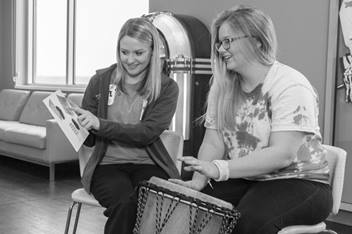Inpatient Rehab Referrals
Inpatient Rehabilitation is a 12-bed medical unit located within Nationwide Children's Hospital with full access to all medical and diagnostic services. The Rehab Unit is a comprehensive inpatient pediatric specialty program has been accredited by CARF (Commission on Accreditation of Rehabilitation Facilities) since 1992.
To Make A Referral:
- Call: (614) 722-8653
- Fax: (614) 722-8622
- Email Us
Each referral is evaluated individually according to the needs of the patient and family.
For more information, contact our Rehabilitation Coordinator, Cindy Iske, MS, OTR/L.
Admission Criteria
Learn more about our referral sources, patient population, admission parameters and more.
- The patient must be deemed medically stable by the consulting team. The patient must require ongoing medical care by a pediatric Physical Medicine and Rehab physician who will oversee the course of treatment to maximize the patient’s benefit from rehab.
- The patient requires and can tolerate 3 hours of OT, PT and/or Speech a day, 5 days a week.
- The patient should be able to follow one-step commands or show significant potential to follow commands.
- The patient can be expected to make measurable improvements in functional areas such as mobility, self-care, bowel/bladder, cognition, communication and/or swallowing.
- For those patients who are neither following commands nor meeting the criteria for participation, a 2-week trial for medication management, equipment evaluation and extensive education and training for caregivers will be considered.
- There are preliminary plans for discharge established, as well as identified training and educational needs.
- The patient and family must have needs and goals that can be met by the services offered in our rehabilitation program.
- The patient and family must be willing to participate in the inpatient rehab program.
Insurance accepted: All types of commercial insurance, Managed Medicaid Programs, Medicaid, BCMH and self-pay. Always check with your health plan for the most up-to-date coverage. Click here to learn more about fee structure. This link does not include physician charges.
Continued Stay Criteria
Patients are continually monitored to determine the ongoing needs and appropriateness of participation in our comprehensive inpatient rehabilitation program (IPR). Patients will be evaluated to determine progress towards treatment goals and the necessity of continued treatment. Input from the patient/family and the members of the interdisciplinary team are used to continually update the treatment plan and discharge planning.
A patient is considered eligible for continued stay when:
- There is evidence that the patient has reasonable potential to achieve their functional goals.
- The members of the team can document significant and continued progress towards functional goals.
- The patient and family can continue to actively participate in their care.
- The patient requires ongoing medical and nursing needs that necessitate hospitalization while benefiting from continued therapy.
Discharge Criteria
Guidelines for discharge to home or transfer to the most appropriate level of care include, but not limited to:
- When the patient has achieved the goals of rehabilitation; caregivers have completed all necessary education and training; and a safe plan for discharge has been established.
- When a patient is determined to have no potential to further benefit from the comprehensive IRP.
- When a patient reaches a sustained plateau and is unable to make further progress towards rehabilitation goals.
- When the patient no longer requires interdisciplinary services to achieve rehabilitation goals or can achieve the rehabilitation goals in a less intense setting.
- When the patient experiences a major surgical or medical situation that interrupts or compromises their ability to participate in rehabilitation services, they will be transferred to another service, if deemed appropriate by the attending PM&R and consulting physicians.
- When the patient displays behaviors that preclude benefit from a continued intensive rehab program and/or the patient /family are no longer willing to be active participants in the program.
- A non-voluntary discharge from IPR may occur if the patient/family are asked to leave the program due to unacceptable behaviors. If the parents decline and/or refuse, the social worker will identify a plan which might include the next steps of contacting Children’s Protective Services (CPS) of the appropriate county.
- When the patient/family exercises legal rights and refuses continued services
- When financial resources are no longer available.

